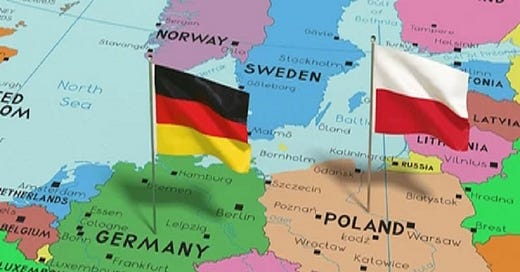Poland’s new liberal-globalist regime has militarily and politically subordinated their country to ideologically aligned Germany just like the conservative-nationalist opposition warned would happen, which turns it into Berlin’s largest vassal state.
The Polish conservative-nationalist opposition’s fears that the Prime Minister Donald Tusk will subordinate their country to Germany were extended credence after two developments this week. Defence Minister Wladyslaw Kosiniak-Kamysz signed a “military Schengen” deal with Germany and the Netherlands in Brussels on Tuesday while Foreign Minister Radek Sikorski declined to mention the word reparations when speaking with his German counterpart about World War II compensation the day after.
The first will enable Germany to freely move troops through Poland to its planned tank base in Lithuania and will likely lead to its first permanent deployment there since World War II judging by Deputy Foreign Minister Andrzej Szejn’s explicit welcoming of this exact same scenario in mid-January. Instead of Poland playing its previous government’s envisaged frontline role in containing Russia, it’ll now be Germany that’ll do this via its envisaged “Fortress Europe” concept, which is built upon the “military Schengen”.
As for Sikorski’s reluctance to mention the word reparations and his oddly phrased request for “the German government to think creatively about how to find a form of compensation for war losses”, this amounts to nothing less than the de facto rescinding of the previous government’s €1.3 trillion demand. It was always unrealistic to expect them to pony up, but as explained here at the time, it was meant to flex Poland’s regional leadership ambitions. They’re now a distant dream after Tusk’s return to power.
Taken together, Poland’s new liberal-globalist regime has militarily and politically subordinated their country to ideologically aligned Germany just like the conservative-nationalist opposition warned would happen, which turns it into Berlin’s largest vassal state. The Polish Armed Forces might soon come under the Bundeswehr’s tutelage, which will play the leading role containing Russia in Europe at the US’ behest, while Poles could be told that this is “creative compensation” for World War II.
The previous government’s reparations demand, no matter how impossible it would have been to force Germany to implement, served to present Poland as its neighbor’s geopolitical equal in their now-defunct regional competition for influence that ended with Tusk’s return to power. The de facto rescinding of this policy via the new proposal for a “creative form of compensation” instead powerfully symbolizes that the new liberal-globalist regime doesn’t dare to offend its patron’s historical sensitivities.
As the ultimate sign of fealty, they’ll also allow German troops to freely move through the country while also likely inviting them to permanently deploy there too after some time per Szejn’s explicit welcoming of this scenario, which physically entrenches Germany’s newly reasserted hegemony over Poland. The patriotic conservative-nationalist opposition will therefore struggle to restore their country’s sovereignty since the policies that their liberal-globalist rivals are actively implementing are meant to be irreversible.




